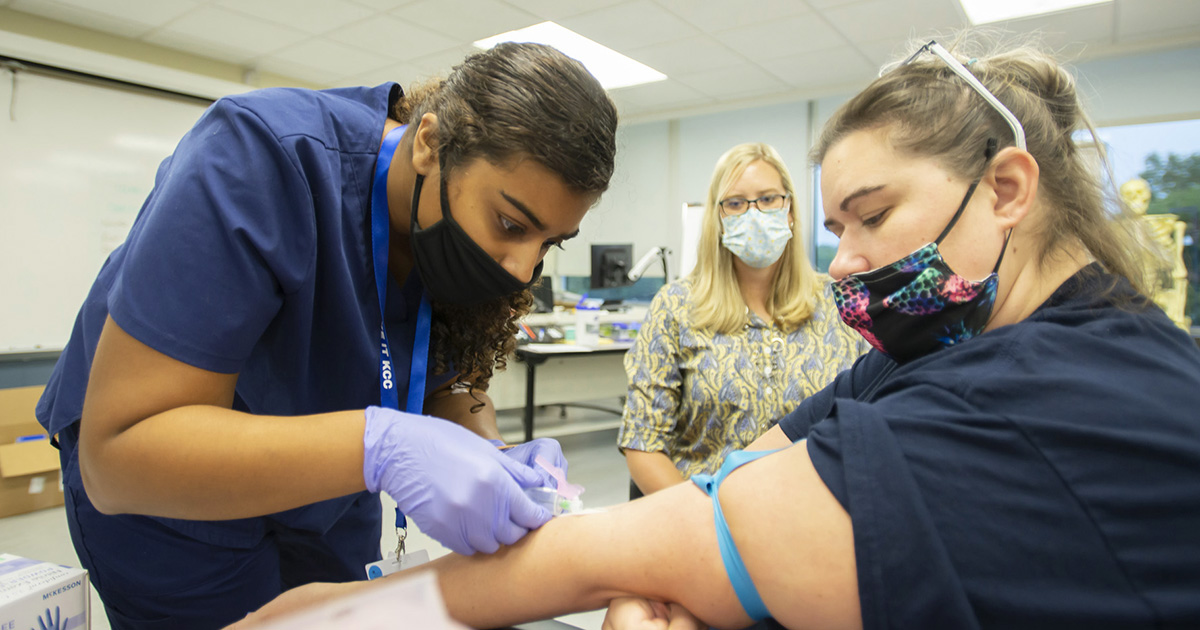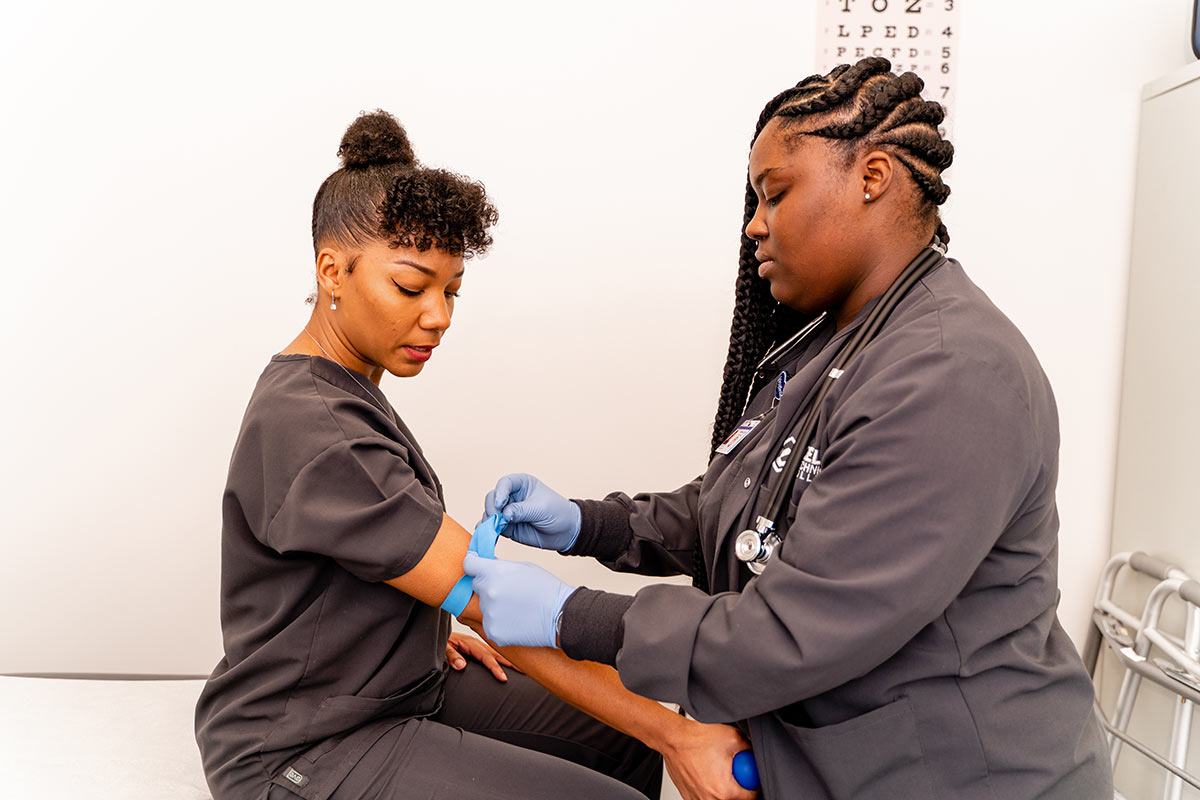Phlebotomy Courses Near Me: Why They're in High Demand
Phlebotomy Courses Near Me: Why They're in High Demand
Blog Article
What You Need to Know Before Starting a Phlebotomy Educating Course for Future Success
Before you start a phlebotomy training program, it's necessary to recognize what the function involves and the skills you'll require to succeed. Investigating certified programs can establish the structure for your education and learning, yet don't overlook the significance of hands-on experience and interpersonal skills. You'll additionally intend to take right into account certification requirements specific to your state. What should you focus on in your prep work? Allow's check out the crucial variables that can shape your future in this field. Phlebotomy Classes Near Me.
Recognizing the Role of a Phlebotomist
Phlebotomists play an important role in the medical care system, as they are accountable for injuring samples for examinations, transfusions, or contributions. You'll locate yourself working in different setups, like medical facilities, centers, and labs, where precision and professionalism and reliability are crucial. Every day, you'll communicate with patients, discussing treatments to relieve their anxiousness, which helps develop count on and connection.
Your tasks consist of preparing devices, maintaining a clean and sterile setting, and making sure accurate labeling and documents of samples. You'll also require to stay updated on safety methods and guidelines, as patient security is non-negotiable. Phlebotomists typically work together with other health care specialists, contributing to accurate diagnoses and effective therapy strategies.
In this duty, you need to be detail-oriented and effective, in addition to possess a strong feeling of empathy. Being a phlebotomist isn't nearly drawing blood; it has to do with making a positive effect on clients' lives.
Trick Skills Needed for Success in Phlebotomy
To flourish in phlebotomy, you'll require a blend of technological and interpersonal abilities that establish you aside from others in the healthcare area (Phlebotomy Training Course). First, understanding venipuncture methods is important; you need to be comfy with needles and learn to injure effectively. Focus to detail is essential, as precise labeling and documentation can greatly influence individual care
Social abilities additionally play a vital function. You'll connect with people regularly, so being empathetic and approachable aids alleviate their anxiety. Great interaction abilities are necessary for clarifying procedures and making sure clients really feel educated and safe.
Additionally, time administration and business abilities will maintain you effective, particularly in active health care settings. Staying upgraded on safety and security procedures and regulations is non-negotiable to assure both your safety and security and that of your patients. By developing these skills, you'll position on your own for success in the vibrant area of phlebotomy.
Picking the Right Phlebotomy Educating Program
Exactly how can you guarantee you're picking the best phlebotomy training program for your demands? Begin by researching accredited programs in your location. Accreditation verifies the program meets market requirements and gives top quality education and learning. Inspect the curriculum to validate it covers crucial abilities like venipuncture, client communication, and safety and security methods.

A program that assists you protect a work post-training can offer you a significant benefit in your phlebotomy profession. With these aspects in mind, you'll discover a program that fits your goals and collections you up for success.
Certification and Licensing Demands
When it involves starting your phlebotomy occupation, comprehending accreditation and licensing demands is necessary. Each state has particular policies you require to adhere to, so it's crucial to research study what relates to you. Furthermore, you'll need to navigate the accreditation test process to assure you're totally qualified.
State-Specific Laws
While going after an occupation in phlebotomy, comprehending state-specific guidelines for accreditation and licensing is vital. Each state has its very own requirements, which can differ substantially. Some states require you to acquire a certification from an identified company, while others may not have any official qualification needs whatsoever. It is essential to research your state's regulations to assure you're compliant. Additionally, some states may mandate a specific number of medical hours or a certain level of training before you can function as a phlebotomist. Make sure to remain updated on any type of changes in laws, as these can influence your capacity to practice. By understanding what's called for, you'll be much better prepared to begin your phlebotomy career successfully.
Certification Test Refine
As you get ready for a career in phlebotomy, recognizing the certification exam process is necessary to your success. Initially, research study the licensing organizations, like the National Phlebotomy Association or the American Culture of Phlebotomy Technicians. Each has you can find out more particular demands, including training, professional experience, and application fees. When you meet these requirements, you'll need to schedule your exam. It commonly contains multiple-choice questions covering subjects from composition to security procedures. Research study vigilantly using technique examinations and testimonial products. After passing, you'll obtain your accreditation, which enhances your employability. Remember, preserving your qualification may need proceeding education and learning or regular re-examinations, so remain notified regarding any modifications in laws to guarantee your credentials remain legitimate.
Work Market Overview for Phlebotomists
As you take into consideration a job in phlebotomy, it is important to understand the work market outlook. Need for skilled phlebotomists gets on the increase, driven by the growing health care sector. You'll likewise would like to know what income expectations to expect as you tip right into this gratifying field.
Employment Demand Trends
Hospitals, centers, and blood donation facilities are actively looking for certified phlebotomists to meet the requirements of individuals requiring regular blood work and specialized examinations. With an emphasis on preventive care and very early medical diagnosis, your abilities in phlebotomy will certainly be important. Staying upgraded with accreditations and training can enhance your employability and position you positively in this expanding job market.
Wage Expectations Introduction
Phlebotomists can anticipate a competitive salary that shows their skills and the expanding need in the health care industry. Typically, you may gain in between $35,000 and $45,000 per year, depending upon your location, experience, and the facility you help. In metropolitan locations, incomes have a tendency to be greater as a result of the cost of living and boosted need for medical care services. Furthermore, qualification can boost your gaining potential, making you an extra appealing prospect. Many phlebotomists likewise delight in benefits such as medical insurance and retirement, which can even more include in your overall compensation. As the market remains to broaden, work possibilities and income prospects for phlebotomists are most likely official website to boost, making this an appealing occupation choice.
Prospective Career Paths and Innovation Opportunities
While pursuing a phlebotomy training program, you may uncover a range of career courses and innovation chances that await you in the healthcare area. As a qualified phlebotomist, you can function in medical facilities, blood donation centers, or diagnostic labs. Each setting offers distinct experiences and difficulties, permitting you to hone your abilities.
You can also check out specializations, such as becoming a donor phlebotomy service technician or a research laboratory aide. These duties often supply extra training and can cause greater salaries.
Networking within the health care community can additionally help you discover job openings and mentorship continue reading this chances. Welcome these possibilities, and you'll find that your phlebotomy occupation can evolve in exciting methods.
Tips for Prospering in Phlebotomy Training and Beyond

Method makes perfect, so make use of any hands-on opportunities. Familiarize yourself with different methods and tools to construct your self-confidence. Keep a favorable perspective, as your mindset can substantially influence your performance.
Connect with market specialists and look for mentorship; this can cause useful insights and work possibilities after college graduation. Take into consideration continuing education or accreditations to improve your skills and remain upgraded in the area. By adhering to these suggestions, you'll not just be successful in your training yet also lay a solid foundation for a satisfying job in phlebotomy.
Often Asked Questions
What Is the Typical Cost of Phlebotomy Training Programs?
The standard expense of phlebotomy training programs normally ranges from $700 to $2,500, relying on the establishment and location. You need to research various alternatives to find a program that fits your spending plan and needs.
The Length Of Time Does Phlebotomy Training Usually Require To Full?

Exist Age Restrictions for Joining in Phlebotomy Courses?
There aren't rigorous age limitations for phlebotomy courses, but the majority of programs need you to be a minimum of 18. Some might accept more youthful pupils with parental approval or if you're enrolled in a relevant academic program.
Can I Work While Participating In Phlebotomy Educating?
Yes, you can function while participating in phlebotomy training. Lots of trainees manage part-time work alongside their research studies. Simply see to it to balance your timetable efficiently, so you can concentrate on both work and your training.
What Material Do I Required for Phlebotomy Training?
For phlebotomy training, you'll require individual protective equipment like handwear covers and masks, lab coats, a sharps container, alcohol wipes, needles, and blood collection tubes. Make certain you've obtained every little thing all set prior to your first class starts.
Report this page